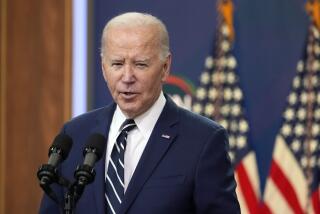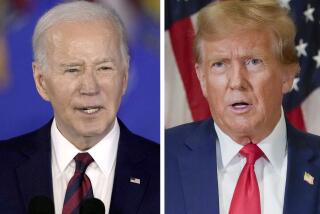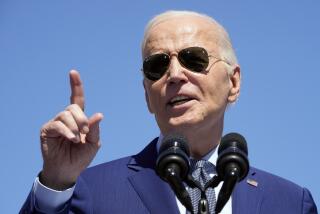Why Syria has had limited impact on Obama’s poll numbers
President Obama has taken a pounding in the press and from other political figures over his handling of the conflict in Syria. How much political damage has that caused him?
Polls offer mixed evidence – some show a steeper decline in his job approval than others – but the bulk of the evidence suggests a relatively modest hit. Some experts in the presidency say that’s no surprise.
The best evidence comes from those who aggregate poll results and present an average of their findings. That approach reduces the impact of one poll being an outlier. The average maintained by the Huffington Post’s Pollster site, which has a consistently good record for accuracy, shows Obama’s approval rating having declined by 4 percentage points since the end of May, when approval and disapproval both stood a few tenths of a point above 47%. As of the latest compilation Thursday, 51.1% disapproved of Obama’s job performance, while 43.1% approved.
Given how negative the coverage of Obama has been lately, that relatively small decline might seem surprising. What’s behind it?
TRANSCRIPT: Obama makes his case to the nation
First, of course, while a majority of Americans don’t approve of how Obama has handled Syria, they also don’t consider Syria among the country’s most pressing problems. In Gallup’s regular survey of what Americans view as the top issues, Syria has now risen to fifth place, with only 8% of Americans rating it as the top issue. The economy and unemployment remain the most-cited issues, although their dominance has faded steadily over the last year.
Indeed, although the decline in Obama’s approval has been steeper on foreign policy than his overall performance, the difference is minor. On foreign policy, which polls don’t ask about as often as overall approval, Obama has dropped an average of about 5 percentage points since early June, from 42.3% to 37.4% now, with about 52.9% opposed, according to the polling average.
Partisanship, which has played a major role in Obama’s political success all along, makes up another big part of the explanation. Just as Republicans won’t suddenly decide they like Obama, regardless of what he does, Democrats are loath to turn against him.
Obama’s approval can’t go much lower among Republicans, who have disapproved of him by overwhelming majorities since early 2010. Fewer than 10% of self-described Republicans say they approve of his performance. So much of his decline since May has involved a drop among Democrats. A large majority of Democrats still approve of Obama’s work – just not quite as big a majority as a few months ago. Among Democrats, his approval rating has dropped from more than 80% to about 74%. He has had a similar drop among independents.
A final factor, noted by Andrew Rudalevige, a government professor at Bowdoin College who specializes in the presidency, is a shift in news coverage. In a post on the Monkey Cage blog, Rudalevige notes that in the pre-Watergate era, when the tone of press coverage turned negative, voters tended to sour on a president. In those days, most press coverage was positive, he notes, so negative coverage signaled to Americans that something serious had gone wrong.
But in the decades since, the tone of press coverage has become heavily negative for presidents in both parties (despite what partisans on either side seem to think), he says, citing a study of press coverage published in 2008. As a result, when the coverage turns even more negative, voters don’t react much.
Follow Politics Now on Twitter and Facebook
Twitter: @DavidLauter
More to Read
Start your day right
Sign up for Essential California for news, features and recommendations from the L.A. Times and beyond in your inbox six days a week.
You may occasionally receive promotional content from the Los Angeles Times.







